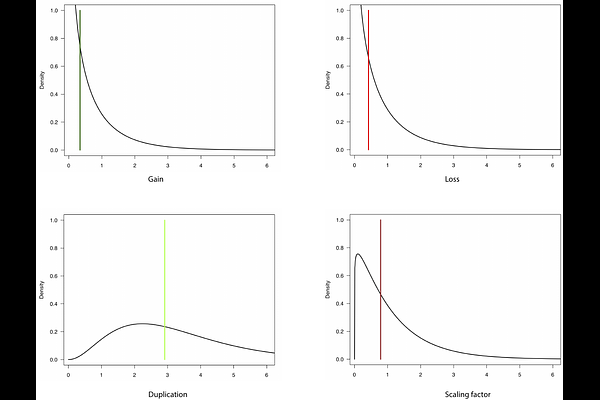Evolution of the Metazoan Protein Domain Toolkit Revealed by a Birth-Death-Gain Model

Evolution of the Metazoan Protein Domain Toolkit Revealed by a Birth-Death-Gain Model
Xiao, Y.; Stolzer, M.; Wasserman, L.; Durand, D.
AbstractDomains, sequence fragments that encode protein modules with a distinct structure and function, are the basic building blocks of proteins. The set of domains encoded in the genome serves as the functional toolkit of the species. Here, we use a phylogenetic Birth-Death-Gain model to investigate the evolution of this protein toolkit in metazoa. Given a species tree and the set of protein domain families in each present-day species, this approach estimates the most likely rates of domain origination, duplication and loss. Statistical hierarchical clustering of domain family rates reveals sets of domains with similar rate profiles, consistent with groups of domains evolving in concert. Moreover, we find that domains with similar functions tend to have similar rate profiles. Interestingly, domains with functions associated with metazoan innovations, including immune response, cell adhesion, tissue repair, and signal transduction, tend to have the fastest rates. We further infer the expected ancestral domain content and the history of domain family gains, losses, expansions, and contractions on each branch of the species tree. In contrast to recent reports of widespread loss during metazoan evolution, we observe little evidence of genome streamlining. Rather, our analysis reveals an ongoing process of domain family replacement and resizing, consistent with extensive remodeling of the protein domain repertoire. The use of a powerful, probabilistic Birth-Death-Gain model reveals an unexpected level of genomic plasticity and a striking harmony between the evolution of domain usage in metazoan proteins and organismal innovation.